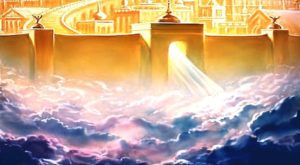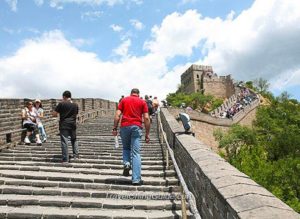A sermon by Christopher L. Webber for the 6th Sunday of Easter – May 26, 2019
In the spirit the angel carried me away to a great, high mountain and showed me the holy city Jerusalem coming down out of heaven from God.
I saw no temple in the city, for its temple is the Lord God the Almighty and the Lamb. And the city has no need of sun or moon to shine on it, for the glory of God is its light, and its lamp is the Lamb. The nations will walk by its light, and the kings of the earth will bring their glory into it. Its gates will never be shut by day– and there will be no night there. People will bring into it the glory and the honor of the nations. Revelation 21:22-27
Here’s the tragedy: millions of Christians will go to church this morning but not all of them will hear the description we just heard of the city of God. Roman Catholics will hear it, and Lutherans and Presbyterians and Methodists and Episcopalians, but you know who won’t hear it: most evangelical Christians, because those churches follow no set lectionary and the pastor can choose what he wants to preach about. So most evangelicals won’t hear today about the promised city of God which may have walls but also has gates that are never shut.
We Americans need to think about that: heaven is like a city with gates that are never shut, never closed at all day or night. The divisions within our society seem constantly to grow worse and it doesn’t help at all that we hear different parts of the Bible on Sunday morning. Imagine what a difference it could make if we all began the week from the same place with the same words of scripture in our minds and hearts. Imagine what a difference it would make if we all began this week with the same vision: God’s city, God’s city, where the gates are never closed.
You could point out, of course, that the city of God described in the Bible does have walls. Yes, it does, but that’s because an ancient city was defined by walls. If a community has walls, it’s a city. If it doesn’t, it isn’t. But in the heavenly city, the gates are never closed. That’s what makes the difference.
There was a time in the progress of humanity when people began coming together to build a more complex community. They had learned how to grow grain – rice or wheat or barley or quinoa and grain was a food that could be stored and that meant that you could settle down and live in one place. You could have a house instead of a cave. You could be a farmer instead of a hunter-gatherer. You could develop a community and you could put up walls to protect yourself against wild animals and wild people. You could live inside the walls and be safe and go out to work in your fields and bring your harvest into the city to store it safely. Outside the city walls there might be other smaller communities, but they also relied on the city walls for safety. A city was a community with walls. A village was a community without walls, but near enough to the city to fly there for refuge in times of trouble.
Maybe you’ve visited England or France or other European countries and seen the remnants of the walls that once protected them but are no longer needed. I think there’s only one city left in England that has a complete wall still standing, and that’s the city of Cheshire on the border with Wales. I spent some time in that area years ago and I took time one day to walk around that wall. These days there’s as much city outside the wall as inside because they’ve outgrown the need for city walls. In most places around the world human beings have outgrown the need for border walls as well. The Great Wall of China is for  tourists to climb on. Even the Berlin wall finally had to come down. The idea of a wall on our southern border is out of date and absurd. Most illegal immigrants don’t come across the Mexican border anyway; they come by plane and overstay their visas. And they will continue to come as long as there are jobs Americans don’t want. They will continue to come to do not just the stoop labor of picking strawberries in the central valley emptying bed pans in our nursing homes and waiting on table in retirement communities. I’ve met people where I live from the Philippines and Bosnia and Uruguay and Uzbekistan and the Ukraine. And they don’t necessarily want to be here. Many of them have families back home that depend on them and they go back whenever they can – if they can. This country does have walls, but they’re economic walls. There are millions who would come here if they could, millions who are here who would rather be elsewhere.
tourists to climb on. Even the Berlin wall finally had to come down. The idea of a wall on our southern border is out of date and absurd. Most illegal immigrants don’t come across the Mexican border anyway; they come by plane and overstay their visas. And they will continue to come as long as there are jobs Americans don’t want. They will continue to come to do not just the stoop labor of picking strawberries in the central valley emptying bed pans in our nursing homes and waiting on table in retirement communities. I’ve met people where I live from the Philippines and Bosnia and Uruguay and Uzbekistan and the Ukraine. And they don’t necessarily want to be here. Many of them have families back home that depend on them and they go back whenever they can – if they can. This country does have walls, but they’re economic walls. There are millions who would come here if they could, millions who are here who would rather be elsewhere.

There are millions of Americans, by the way, who live elsewhere by choice – in Mexico and Panama and Portugal – because its cheaper and warmer there than here. People who can afford to live elsewhere are happy to leave America. So we can build a wall on the Mexican border or not and it won’t make much difference. What will make a difference is the kind of community we build here, here where we are. Walls don’t matter; they keep them in Chester as a tourist attraction and someday whatever we build between us and Mexico may have that value also, but what matters is what happens inside the walls – in the city – don’t miss what the Bible says about that: “People will bring into it the glory and the honor of the nations. But nothing unclean will enter it, nor anyone who practices abomination or falsehood.” No one who practices falsehood will be in God’s city, no one who tells lies will be there. God’s city is a place where people tell the truth and they bring into that community all that is good – the glory and honor of the nations. Nothing unclean will enter it. In God’s city no one will sleep on the sidewalk or under bridges. Forget about the borders, what matters is what happens inside.
In God’s city the walls are a tourist attraction but there’s no darkness there, nothing false, nothing unclean, San Francisco is not like that. I hope for the day that I can walk up 19th avenue from the N-Judah and see no litter, no trash on the sidewalk. I may be wrong, but I think it comes from the young men and women who I see standing on those sidewalks at 8 and 8:30 every weekday morning waiting for the giant bus to come and scoop them up and take them to Silicon Valley. I don’t see trash on the other side of the avenue so I think it’s these young Americans with jobs no Mexican immigrant could hope for who trash the sidewalks that others sleep on. Wouldn’t you think that we who live here because of choices our grandparents or great grandparents made could do better at preserving the dream?
We’re given a vision. How do we share it? How do we tell our friends and neighbors it doesn’t have to be this way? God gives us a vision of a new community. The verses we read this morning come from the next to last chapter of the Bible: This where we are going. This is the vision God gives us, not just to dream about but to work for and to share. A few verses earlier the vision began this way – I wish we’d had a longer reading but I’ll read it anyway:
Revelation 21:1 Then I saw a new heaven and a new earth; for the first heaven and the first earth had passed away, and the sea was no more. 2 And I saw the holy city, the new Jerusalem, coming down out of heaven from God, prepared as a bride adorned for her husband. 3 And I heard a loud voice from the throne saying, “See, the home of God is among mortals. He will dwell with them; they will be his peoples, and God himself will be with them; 4 he will wipe every tear from their eyes. Death will be no more; mourning and crying and pain will be no more, for the first things have passed away.” 5 And the one who was seated on the throne said, “See, I am making all things new.” Also he said, “Write this, for these words are trustworthy and true.”
Notice this one thing: this new city is not somewhere else, not in a distant heaven, but here. We don’t go up to it; it comes down to us. And I believe it’s up to us to prepare the way: to hold in our minds and hearts the vision of the city of God and not settle for anything less.